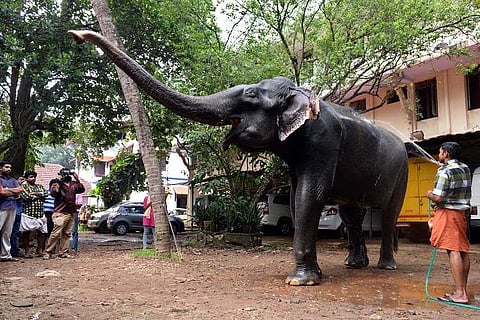

On Wednesday, in a glittering event held in Thiruvananthapuram, 86-year-old Dakshayani was conferred the ‘Gaja Muthassi’ (Grandma elephant) title. Dakshayani's vision is failing, her eyes drooping and skin wrinkled, but she is still paraded at temple festivals by her owner, the Travancore Devasom Board.
The board that controls around 1250 temples in Southern Kerala including Sabarimala is proud of the oldest captive elephant and hopes she enters the Guinness Book of Records.
The Devasom Board has already written to the Guinness authorities staking claim to Dakshayani being the oldest living elephant in the world. As per the TDB, the oldest living elephant, which was 85 years old, died in 2003 in Taiwan.
TBD president Prayar Gopalakrishnan said that the Devasom is looking forward for the recognition to be conferred to Dakshayani. "Dakshayani and another elephant, are the only ones of the 10 that have been there with the TDB since its inception in 1949, which are alive now. She was gifted to the TDB by the erstwhile Travancore Royal family."
According to Gopalakrishnan, Dakshyayani is taken to temples in Thiruvananthapuram district, but not outside.
Not everyone is happy with the TBD and its effort to not let Dakshayani retire.
Maria Jacob, an animal rights activist told NDTV's Sneha Mary Koshy that after 65, elephants should be allowed to retire. "It's cruel. Temples, churches, mosques should stop the practice of using elephants for their rituals and festivities," Maria Jacob said.
Secretary of Heritage Animal Task Force VK Venkitachalam says that calling Dakshayani the World’s oldest captive elephant is absurd, as most countries do not accept the term captive elephants. “Even in Asian countries, it is only in India that these elephants are chained,” he pointed out. He further rubbished the logic in conferring “Gaja Muthassi” title.
He also informed that he has written to the World Record Forum pointing out that issues of ownership certificate and other violations must be looked into.
TDB president Prayar Gopalakrishnan disagrees with Venkitachalam and says that records were available with them, including those from the Kerala Forest Department that apaprently show that Dakshayani is the oldest.
What does the law say?
The Kerala Captive Elephants (Management and Maintenance) rules, 2003 says that a captive elephant shall normally be allowed to retire at 65 years of age.
Retirement of Elephants
(a) An elephant shall normally be allowed to retire from its work on attaining an age of 65 years
(b) Healthy elephants above 65 years of age shall be allowed to be put to light work under proper health certificate from the veterinary doctor.
(All photographs by Sreekesh Raveendran Nair)